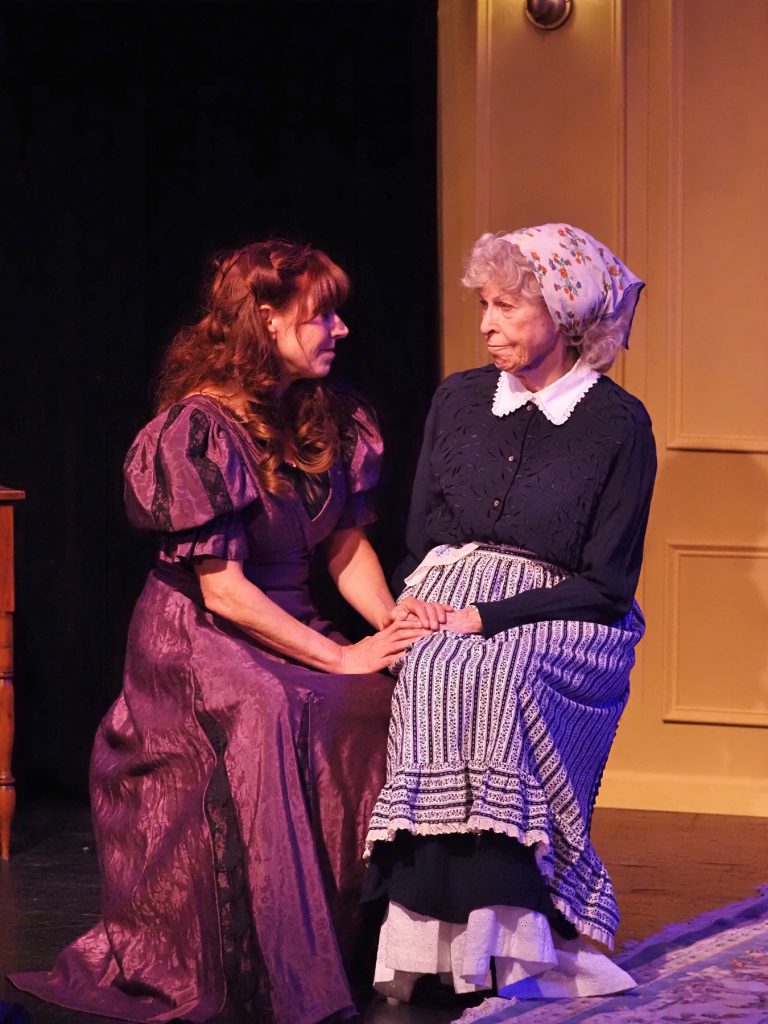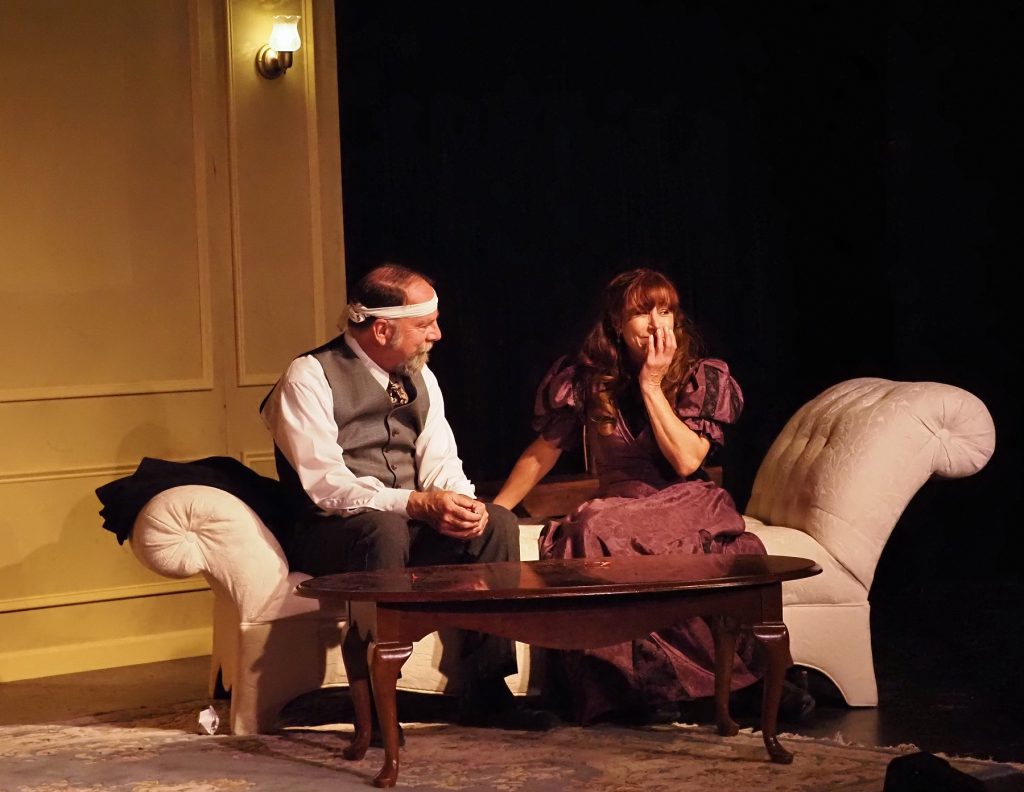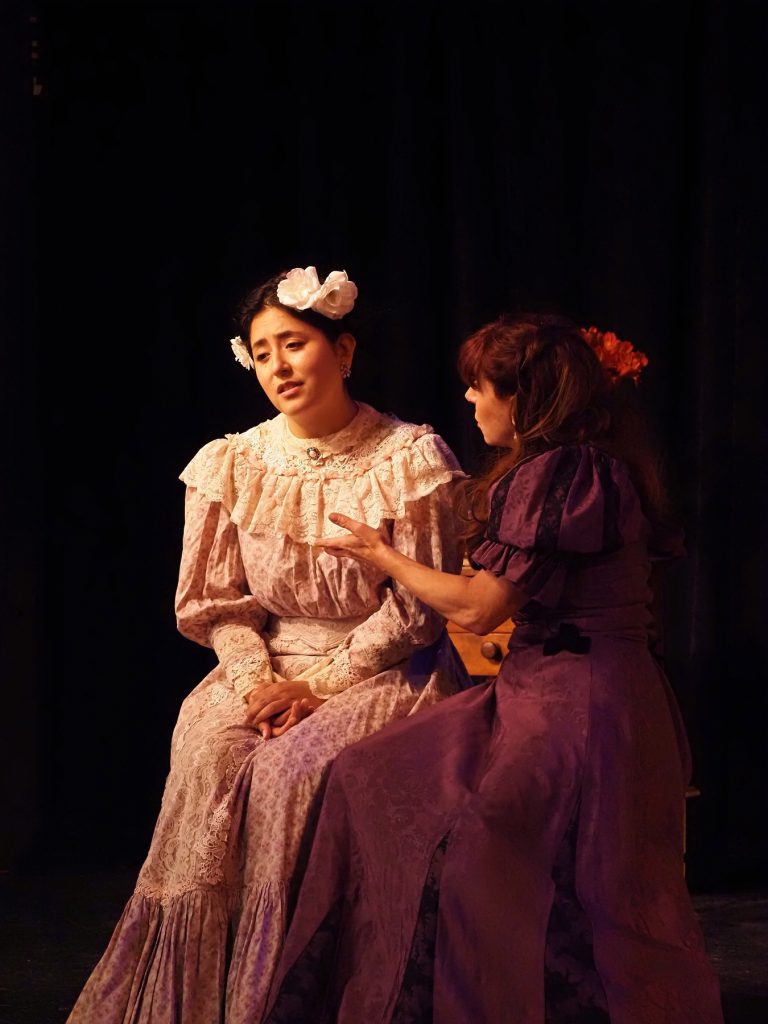
NTC’s new production of this concept play is thoughtfully wrought on the narrow NTC stage that represents Torwald’s Victorian house. It is a sequel to the original play, but stands alone as a statement of women’s progress in the age when women were marching for women’s suffrage.
Written and produced in a time that is 140 years later than the date of the play, Lucas Hnath’s sequel is more than just a rehashing of old wounds; it has a life of its own meant to resolve the questions left by Henrick Ibsen when Nora walked out. She walked out on husband and family with a slam of a door. Did she regret the move? Did she miss the family and social standing? What happened to her?
Anne Marie (played by Shirley Nilsen Hall) opens the door to the play, admitting Nora (played by Alison Peltz) into the upscale Torvald house. Hall plays a dedicated maid who recognizes Nora almost immediately, and is wary of ghosts coming home. Nora is dressed in a beautiful period costume that leaves no question that she has done well for herself. Both characters are well defined by director Gillian Eichenberger. They pace around each other as enemies; Anne Marie is worried by the sudden change to their personal world and Nora strives to keep her self-esteem in this now-unfamiliar household.

In walks Nora’s daughter Emmy (played by Jannely Calmell), without much reaction to her mother. Eventually, Nora’s husband, Torvald (played by Mark Clark), enters to the situation without initial recognition of his long estranged wife. After a good period, he recognizes Nora and has to leave the stage to compose himself. Upon his return, the reason for Nora’s return is made clear to all: she wants a divorce.
Okay. Clark responds quite normally (and emotionally) to the initial shock of seeing Nora after 15 years. Director Eichenberger has gleaned the best emotional catharsis in these first minutes of Torvald’s reaction. Nora is all business. We soon find out how Nora has evolved and why she wants the divorce after 15 years. Anne Marie is worried about Torvald, and Emma is unaffected.

After Nora has explained her needs to Torvald, both characters are moved to change radically. This mutual evolution is the best part of the play. Eichenberger has balanced the personal changes well, with clarity and understanding. Some profanity is used as a vehicle to add some shock value to the scenes, but it is unnecessary and out of place in upscale 1879 households.
Light designer Frank Sarubbi has created a good simple light that focuses the action and closes with his signature 4th wall perspective. Michael Walraven’s set enhances the story with a clean and elegant backdrop.
Calmell’s reaction to seeing her mother for the first time in 15 years was too understated for this reviewer. Otherwise, the show is a good fantasy that extends Ibsen’s original cultural premise that marriage in the 1800’s was neither fair nor liberating for either party, but rather like a cage that needed the door opened to humanity.
Nora left Torwald in 1879, depressed and angry by the social stigmas of marriage of the time. The play offers a transition that works to clear the air 15 years later.
Novato Theater Company cast and crew and house are fully vaccinated for COVID-19; masks are required for all audience.
“The Doll House, Part 2” continues at Novato Theater Company at 520 Nave Drive, Novato, through June 12, 2022.
For further information and reservations: https://www.novatotheatercompany.org/
Rating: ***½
“A Doll’s House, Part 2,” by Lucas Hnath, produced by Novato Theatre Company. Director: Gillian Eichenberger, Set Designer: Michael Walraven, Light Designer: Frank Sarubbi, Costume Designer: Ross Valley Players and Mark Clark, Stage Manager: Diane Pickell Gore.
Cast: Alison Peltz as Nora, Mark Clark as Torvold, Shirley Nilsen Hall as Anne Marie, Jannely Calmell as Emmy.


